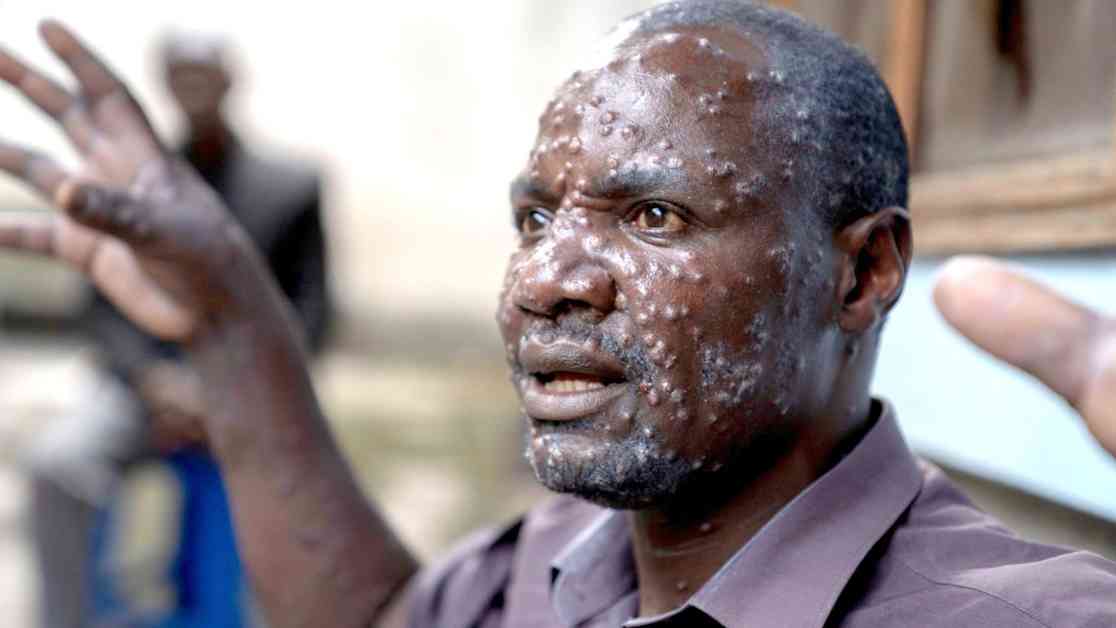The United Kingdom is on high alert as it prepares for potential cases of a new strain of mpox, following the declaration of global emergency by the World Health Organization. The emergence of clade 1b of the virus in the Democratic Republic of Congo has raised concerns, with over 17,000 cases and 571 deaths reported in Africa this year alone, surpassing the previous year’s total. The Africa Centres for Disease Control and Prevention has reported that 96% of all cases and deaths have been concentrated in DR Congo.
According to the UK Health Security Agency (UKHSA), there are currently no cases of mpox in the UK, and the risk is considered low. However, preparation is underway to handle any potential cases that may arise in the country. Dr. Meera Chand, Deputy Director of UKHSA, emphasized the importance of clinicians being able to promptly recognize cases, the availability of rapid testing, and the development of protocols for the safe clinical care of infected individuals to prevent onward transmission.
### Understanding MPOX and its Global Impact
Mpox, formerly known as monkeypox, is primarily transmitted through close physical contact. Common symptoms include a high temperature, headache, muscle aches, backache, and a rash. Dr. Jean Kaseya, Director General of Africa Centres for Disease Control and Prevention, highlighted the spread of cases to 16 countries in Africa, including Ivory Coast, Kenya, Rwanda, and Uganda. This widespread impact led to the declaration of a public health emergency to enhance protection and support for affected countries.
The World Health Organization’s decision to declare an emergency underscores the potential of the clade 1b strain to escalate into a pandemic. The urgency to address the situation stems from the increasing number of cases reported worldwide, emphasizing the need for global collaboration and preparedness to combat the spread of mpox.
### Challenges and Response in the UK
In the UK, 286 cases of mpox were reported between 2023 and July 31 of the current year, with the majority of cases (269) recorded in England. Notably, a significant portion of patients were presumed to have contracted the virus within the country, signaling a shift from previous cases linked to travel to endemic regions in Africa.
A notable outbreak in the UK in 2022, particularly affecting men who are gay, bisexual, or have sex with other men, prompted the implementation of a vaccination program in the summer of that year. The program aimed to contain the spread of the virus and protect vulnerable populations. However, the closure of the vaccination program in July raises concerns about the potential resurgence of cases and the need for ongoing vigilance in monitoring and responding to mpox outbreaks.
### Global Collaboration and Preparedness Efforts
The global response to the mpox outbreak underscores the importance of collaboration and preparedness in addressing emerging infectious diseases. The rapid spread of the clade 1b strain across multiple countries in Africa highlights the interconnectedness of health systems and the need for coordinated action to mitigate the impact of the virus.
Efforts to enhance surveillance, testing, and clinical care protocols are crucial in preventing the further transmission of mpox and reducing the burden on healthcare systems. The declaration of a public health emergency by the WHO serves as a call to action for governments, healthcare providers, and international organizations to prioritize the containment and control of the virus.
### Conclusion
As the UK braces for potential cases of mpox amid the global emergency declared by the World Health Organization, proactive measures are essential to mitigate the spread of the virus and protect public health. Enhanced surveillance, rapid testing, and robust clinical care protocols are critical components of the response to the outbreak.
By staying vigilant and prepared, the UK can effectively manage any cases that may arise and prevent the escalation of the mpox outbreak. Global collaboration and information sharing are key in addressing the challenges posed by emerging infectious diseases and ensuring the health and well-being of populations worldwide.













